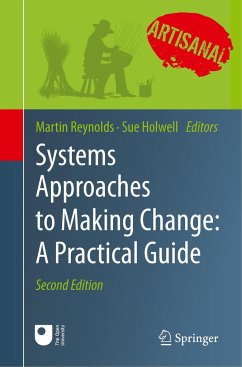The five approaches outlined in this book offers the systems thinking practitioner a range of interchangeable tools for pro-actively making systemic improvements amidst complex situations of change and uncertainty. Practitioners from all professional domains are increasingly confronted with incidences of systemic failure, yet poorly equipped with appropriate tools and know-how for understanding such failure, and the making of systemic improvement. In our fragile Anthropocene world where 'systems change' is often invoked as the rallying call for purposeful alternative action, this book provides a toolkit to help constructively make systems that can change situations for the better.
Systems Approaches offers an excellent introduction for those seeking to understand systems thinking and to enact systems thinking in practice. The book helps practitioners from all professions to better understand inter-relationships, engage with multiple perspectives, and reflect on boundary judgements that can inhibit or enhance improved purposeful change. After an editorial introduction to these systems thinking in practice capabilities, successive chapters illustrate five systems approaches, each chosen for having a rigorous though adaptable framework, and a robust long pedigree of application in complex situations. Each chapter illustrates what the approach is about, followed by invaluable tips and insights from experience regarding how the tools might be practiced. Amongst updates from originating authors for this 2nd edition, each approach has an accompanying postscript on some developments since the 1st edition.
Systems Approaches offers an excellent introduction for those seeking to understand systems thinking and to enact systems thinking in practice. The book helps practitioners from all professions to better understand inter-relationships, engage with multiple perspectives, and reflect on boundary judgements that can inhibit or enhance improved purposeful change. After an editorial introduction to these systems thinking in practice capabilities, successive chapters illustrate five systems approaches, each chosen for having a rigorous though adaptable framework, and a robust long pedigree of application in complex situations. Each chapter illustrates what the approach is about, followed by invaluable tips and insights from experience regarding how the tools might be practiced. Amongst updates from originating authors for this 2nd edition, each approach has an accompanying postscript on some developments since the 1st edition.








